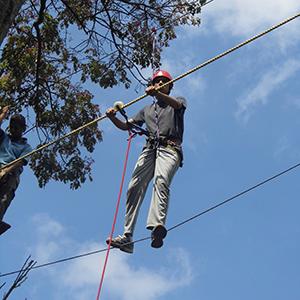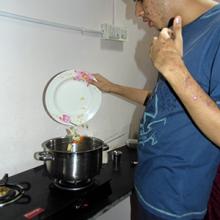
International Autism Awareness Day 2016 #autismawareness
The Amaze Charitable Trust, born from challenges of raising a child with autism, helps families navigate the autism maze through innovative programmes, social skills, adventure camps and employment opportunities, says its director Akila Vaidyanathan.
Could you give us a little background on Amaze Charitable Trust? What was the vision behind Amaze?
Autism is a complex disorder; it affects the core areas of communication and social behavior which are so important for survival in today’s world. Incidence of Autism is on the rise and cause is unclear and there are so many interventions strategies. What works for one child does not work for all.
As parents of a 20-year-old with Autism, what my husband Sriram and I really wanted all along was to have a single point of support where we could be helped to understand our son’s disorder and be guided on what are the key steps we could take to help him improve and learn. We were ready to do whatever it takes to help him but often we felt we were on a rudderless raft drifting on endless journey with no hope or answers and only our own common sense and love for our child to guide us.
We felt the need to reach out to other families like ours, so that we could share our common experiences, learning and resources to build system that focused on a sustainable future for our children. We wanted to prioritize a lifespan approach where we train our children to learn skills that will help them to stay engaged productively throughout their lives. This is when AMAZE was born with a vision to “Help Families Navigate the Autism Maze.”
What are the core values and philosophies of Amaze?
The core values and processes at Amaze are:
- Positive belief in the abilities and potential of all our students irrespective of the severity of the difficulty and challenges. Students are exposed to and engaged in a variety of activities to gauge their abilities and interests and then systematically trained in the areas most suited to them. .
- Individualised approach for each student. We recognize and respect individual differences and learning styles and hence programs are tailor made for each student. We use the very sensory differences that are viewed as a deterrent to learning as a way of reaching the student’s inner world and help them slowly connect with the world outside.
- Scaffolding the learning process using visual supports, process based learning and positive behavioral supports: The overall design of the programs, right from the beginning, includes strategies to wean of physical support, verbal prompts and teach self direction and regulation. The goal is to maximize independence and minimize supervision
- Technology tools to enable access to learning curriculum content as well as have alternate and augmentative response modes are used extensively. Technology based productivity tools to help with self regulation and independence as well and training in employment oriented skills using technology are also part of the core programs.
What are the key activities and programmes of Amaze? How does it support integration of children with special needs?
One of our core programs is: AMEYA: Amaze program for Mentoring and Empowerment of Young Adults.
This is a one of a kind program for students on the Autism spectrum and related disorders from age 16 onwards. They are helped to develop the core skills of communication, literacy and life skills through a comprehensive program which includes technology based learning , office skills, cooking , housekeeping and other advanced life skills like shopping , laundry, etc. Fitness and sports training is also an important aspect of the program and so is Art based therapy.
Right from day one our students are exposed to a real playing field...50% of the time they are in an office like environment at our computer center and 50% of the time they are at the activity center where other skills are practiced on a daily basis. Their timings are like work timings 10am - 5pm.
Our first batch of 5 students is already processing orders for Educational material such as Communication files, Schedules and laminated cards. They are also able to do some basic data entry work and help design worksheets for peers or younger students. We are also receiving some small take away orders for the food they cook and we plan to open a take away restaurant near the center by July this year.
One student from our pilot batch has been placed in open employment with SAP and has completed one year of work there. Another is doing very well in music and few are showing interest in sports and also in the area of Art and Graphic design. One of our students has "Modeled" for the 2016 calendar brought out by Swarga foundation. Our second batch of 5 more students are also progressing well.
Some of these students came to us in June 2014 with severe behavioral issues and zero functional communication skills. Hence, we are really proud of what they are today and the potential they are showing.
Related articles:
People with autism can be employed in mainstream technology roles
There is music in everything I hear
You have been organizing adventure camps for persons with special needs since 2011 in the Nilgiris, Tamil Nadu. What has been the evaluation and assessment of these camps?
Adventure camps for person with special needs and their families, especially Autism is a unique experience being offered by us .This concept was pioneered by Amaze, in collaboration with NALS Outdoors Put Ltd, Coimbatore.
Since 2011, eight Adventure Camps have been organized. Six Camps have been conducted in the NALS Coonoor Campus, one in the NALS Manali Campus and one at Camp Water’s Edge, Takve near Pune. More than 200 persons have benefited by the camps.
The campsites are set in the serene atmosphere of the Nilgiri hills, at the base of the Western Ghats or the Himalayas. Families find the camps a refreshing outing, packed with activities, testing their limits of fear and endurance. High rope activities like burma bridge sloth walk, commando net, flying fox, rock climbing, rappelling and treks keep the children and families engaged and active through the camp duration.
The camps are also lots of fun and families develop new friendships and bonds. The other takeaways have been, stress relief, developing confidence and positive belief in their abilities, group and social skills development for the students and some motor skill improvement like grasp, coordination and spatial awareness.
What are the challenges you’ll encounter while undertaking these camps? Are these camps designed differently keeping in mind people with special needs?
Initially it took some time for the Campsite Management to open up to our students as they feared for their safely. However, when they experienced our students taking to these activities with ease and enthusiasm, the fears vanished and they become more open to supporting such camps.
Our gratitude to Lt Seshadri, Director Operations of NALS who has shown unflinching faith in us and our children and ensured that the camps are a positive experience for all. Extra trainers are provided to support our participants, food preferences are accommodated and the camps are restricted to 60 % occupancy so that the students and families have adequate space to relax when required.
We are extremely happy this concept is catching on in the rest of the country and we are already planning the second camp at Pune later this year. The Coonoor camp may also be run twice a year based on popular demand.
Parents are included in most of these programmes. What kind of training is there for parents? What has been the experience of the young and the parents? What do they have to say?
Parents are important stakeholder’s at Amaze and we view them as our partners in achieving the learning outcomes for our students. Ours is an open door center where we invite parents to visit us and observe, volunteer and participate in our programs as often as they wish.
For the add on programs parents are required to be present at least 50% of the time so that they can generalize the skills learnt at home and the student can progress to higher levels of fluency with the skills learnt at a fast pace .
Progress is reviewed and shared with parents every quarter and feedback is taken from them and incorporated into the student’s individual plans. Parents are also given training on techniques and strategies as well as counseling for family and personal issues that may impact the student.
Testimonials from Parents
“Gokul has benefited and improved a lot, there have been a lot of positive changes in his behavior and he is communicating verbally for his needs.” [Father of Gokul who attends AMEYA program.]
“Surprised to discover his talents!! Very useful.” [Mother to Mithilesh, student in AMEYA program]
“Yes… I believe that he will make it one day!! And, I will believe as long as Amaze is there.” [Mother to student attending Daksh program]
“Akash feels very happy he can do things now. He never says he cannot do anything. He always says, ‘Akash knows, Akash can do.’ Even if we say you cannot do it, he says, ‘No I can!!’” [Akash is 9 and attends Daksh and Achint Programs]
If there was one thing you could change, what would it be? What do you wish for on Autism Awareness Day?
On Autism Awareness day I wish the world would treat with respect those who are different or disabled. The very struggles they go through make them so wise, strong, enduring and endearing. We have lot to learn from these beautiful people. I hope this will happen soon … “As long as hope lives – the possibilities are limitless.”
Check out their video below.
For more details on AMAZE programmes, please check out their website http://www.amazetrust.org/







